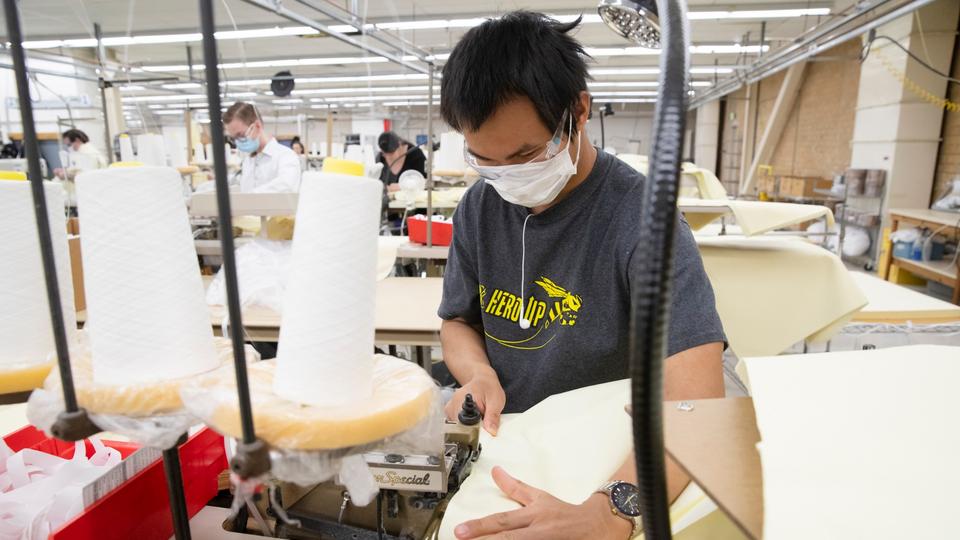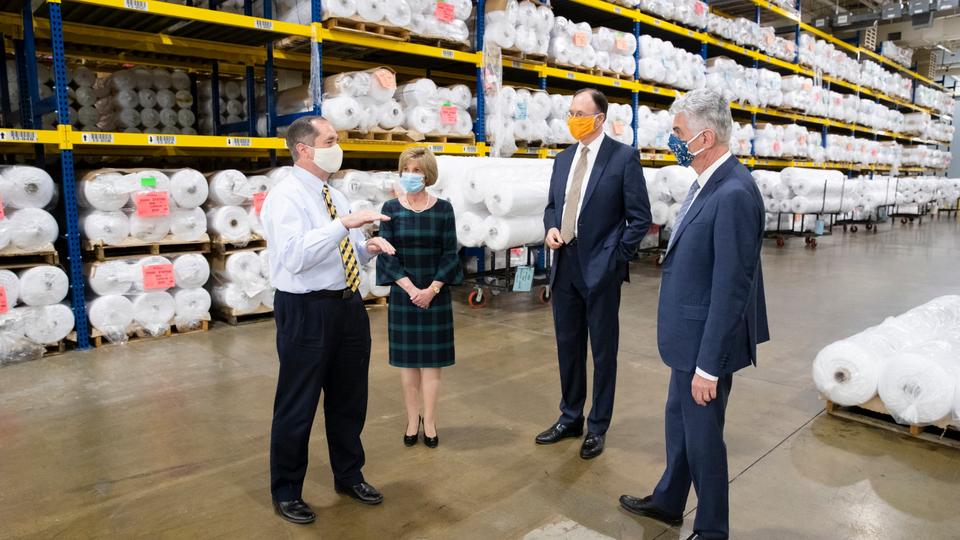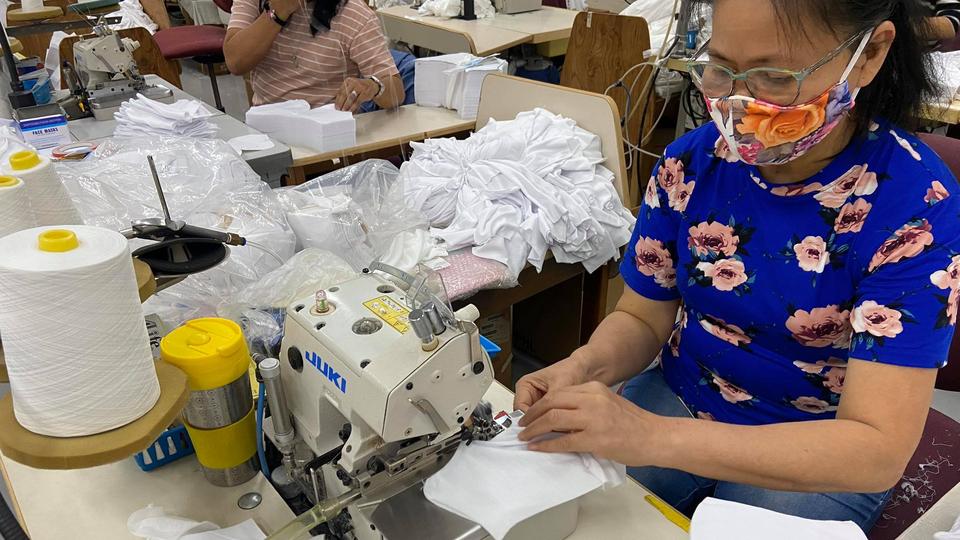Hundreds of thousands of cloth face masks and surgical gowns for health care workers are being produced by employees of Beehive Clothing’s six facilities around the world to help address local needs during the COVID-19 pandemic. The facilities are owned and operated by The Church of Jesus Christ of Latter-day Saints.
Media for journalists: SOTs | B-roll
-
- Beehive Clothing
- Beehive Clothing American Fork
- Beehive Clothing
- Beehive Clothing
- Beehive Clothing
- Beehive Clothing
- Beehive Clothing
- Beehive Clothing
- Beehive Clothing
- Beehive Clothing
- Beehive Clothing
- Beehive Clothing
- Beehive Clothing
- Beehive Clothing the Philippines
- Beehive Clothing Paraguay
- Beehive Clothing the Philippines
- Beehive Clothing the Philippines
- Beehive Clothing Paraguay
- Beehive Clothing Paraguay
- Beehive Clothing Mexico
- Beehive Clothing Mexico
- Beehive Clothing Brazil
- Beehive Clothing the Philippines
| Temple Square is always beautiful in the springtime. Gardeners work to prepare the ground for General Conference. © 2012 Intellectual Reserve, Inc. All rights reserved. | 1 / 2 |
“We, as a global church, have sought ways to help and reach out to our brothers and sisters in Christ around the world. One way that we can help is through offering our services from our sewing facilities,” said Peggy Cowherd, managing director of the Church’s Materials Management Department.
The facilities are located in Brazil, Paraguay, Mexico, the Philippines and the U.S. (in Salt Lake City and American Fork, Utah). Employees shifted their work from producing sacred clothing to sewing medical-grade gowns and cloth face masks after the project received approval from the First Presidency in mid-April.
“Across those six facilities we have about 1,000 employees, and we are donating our time, our labor and our sewing capacity for several months, diverting it from sewing sacred garments to sewing surgical gowns and reusable cloth [face] masks for the community,” said Cowherd.
Beehive Clothing also donated some of its fabric for the projects.
“All of us want to help the effort,” explained Stan Howell, global director of Beehive Clothing. “We want to help the community. We want to help the hospitals. If there is a shortage of something and we can have a small impact on that, we’re going to do everything we can.”
The medical-grade gowns are being made at the Church’s two U.S. facilities. The masks are being produced at the international locations.
“I signed up and volunteered like the first day,” said Jessie Peterson, a Beehive Clothing employee in Salt Lake City, as she ended her shift on Friday. “It’s so great to have an opportunity to be able to provide something for other people, especially something that’s needed as much as this surgical gown.”
Beehive Clothing employees in Utah are working in three shifts to allow for social distancing.
“At Beehive, you always [have] an opportunity to serve,” said Lek Horne, an employee in Salt Lake City. “It’s just an honor for me to do this.”

Beehive Clothing
Men and women work at Beehive Clothing in Salt Lake City, where surgical gowns are being made during the COVID-19 pandemic, Friday, May 15, 2020. 2020 by Intellectual Reserve, Inc. All rights reserved.Workers can sew a gown in less than three minutes. All are size extra-large. “It’s one size fits most,” said Howell.
Cowherd said the gowns have a unique design. “We worked in partnership with Intermountain Healthcare, along with their consultant to ensure that it was an appropriate surgical gown that would provide the protection that is needed by health care providers.”
“It was a little bit of [an] adjustment for us, sewing a woven fabric that’s not stretchy,” said Charlene Johnson, a Beehive Clothing employee in Salt Lake City. “I just really, really love it here no matter what I’m sewing.”
As of Monday, Cowherd reports, approximately 50,000 gowns have been sewn at the two Utah plants, and about 585,000 masks have been completed at the international plants.
“Our goals overall are by the end of June to sew 200,000 surgical gowns and about 1.5 million reusable cloth masks,” she added.
Presiding Bishopric Tours Utah Plant
Members of the Church’s Presiding Bishopric, who oversee the project, took a tour of the Salt Lake City facility on Friday afternoon, May 15, 2020, to express their appreciation to the employees who are working during the pandemic.

Beehive Clothing
The Presiding Bishopric is given a tour of the Beehive Clothing facility in Salt Lake City, where employees are making surgical gowns for health care workers during the COVID-19 pandemic, Friday, May 15, 2020. 2020 by Intellectual Reserve, Inc. All rights reserved.“It is nice for us to be able to serve the community,” said Presiding Bishop Gérald Caussé, who was joined by Bishop W. Christopher Waddell, second counselor in the Presiding Bishopric.
“They’re always so gracious for what we do, and they feel the work is so important. And when they come out, all of the operators here at Beehive Clothing are always very happy and honored to have them visit,” said Howell, who helped host the senior Church leaders during their visit.
“Each of the sewers, as they’ve come from their regular sewing assignment to this area to sew medical gowns, has not just been willing, but excited and happy to do so. They feel honored to be a part of this,” he shared.
Beehive Clothing is donating the labor to sew the projected 200,000 surgical gowns by the end of June. Intermountain Healthcare and University of Utah Health helped purchase the fabric to make 65,000 gowns for use by local medical personnel. Latter-day Saint Charities, the humanitarian arm of the Church, purchased the material for the remaining 135,000 gowns, which it plans to donate to organizations and areas in need.
“There have been many miracles as we worked to get raw materials,” explained John Higginson, purchasing manager for Beehive Clothing. “In the beginning, there were dead ends; then out of the blue, we would get a phone call or email saying, ‘We have something available.’”
International Mask Production
Beehive Clothing’s four international locations were closed during the pandemic, but local governments allowed the Church to reopen the plants to sew masks for their communities.
The Brazil plant plans to produce 600,000 masks and cut an additional 600,000 for volunteers in local congregations to sew. Up to 300,000 masks are being sewn in Paraguay. The Philippines plant is making 400,000 masks. Workers in Mexico are planning to sew 200,000 masks during the project.

Beehive Clothing the Philippines
A Beehive Clothing employee sews cotton material to create a face mask in late April 2020, in the Philippines. The clothing plant's employees shifted from producing sacred garments to sewing face masks for COVID-19 related needs.2020 by Intellectual Reserve, Inc. All rights reserved.Cowherd said the masks can be washed and reused. “They’re made out of a cotton fabric that we had in stock that we use for our sacred clothing. And so, we’re just using fabric that we already have and elastic ties.”
“When I think of Christ and true Christianity, which is serving others, this is a wonderful opportunity to show love for our fellow men and to bless their lives by protecting them through this gift,” said Juan Carlos Caballero, a Beehive employee in Paraguay.
“Since I have joined this team, I feel it is a privilege to work on the Lord’s work,” said Izabel de Oliveira Silva Cunha, a Beehive employee in Brazil. “It is gratifying to know that I serve Him in my daily work. And now, that feeling only increases because it is part of the purpose.”
“We are the Church of Jesus Christ and we follow His teachings to love one another. We are grateful for the privilege of this opportunity to serve in this capacity. We have offered many prayers and we have seen many miracles. It has been a blessing for all involved. It has been heartwarming to see how the global team pulled together to make this happen. When the Lord helps us, special things happen,” said Cowherd.
Regular production of sacred clothing at the six Beehive Clothing locations is expected to resume in July, as local government regulations allow.